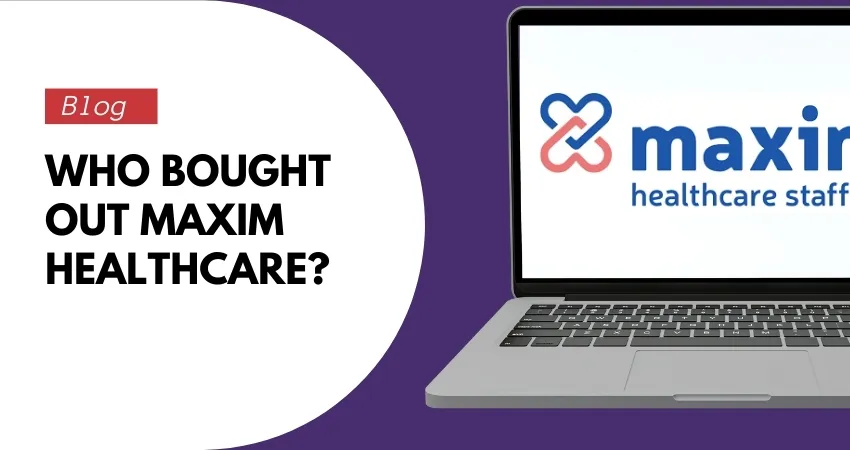The healthcare industry witnessed a potential game-changer in February 2019 when Aveanna Healthcare, a leader in pediatric home care, announced its planned acquisition of the home healthcare division of Maxim Healthcare Services, a giant offering broader services.
This $1.25 billion deal promised a reshaped landscape, but ultimately ended in disappointment. Let’s explore the intricacies of this failed merger and its wider implications.

Who bought out Maxim Healthcare?
As of today, Maxim Healthcare Services has not been bought out. It remains a privately held company headquartered in Columbia, Maryland.
However, the company did undergo a restructuring in 2021, dividing its staffing and home healthcare divisions into two separate entities:
- Maxim Healthcare Staffing: Provides temporary nurses, therapists, and other healthcare professionals to hospitals, clinics, and other healthcare facilities.
- Maxim Healthcare Services: Focuses on providing in-home care services to patients with chronic conditions, disabilities, and seniors.
Maxim Healthcare Services has embraced technological innovation with the introduction of the Maxim Time Clock.
Aveanna Healthcare and Maxim Healthcare’s Unfulfilled Acquisition
The proposed merger wasn’t just about financial gains; it was a strategic dance. Aveanna, renowned for its pediatric expertise, sought to diversify by venturing into adult home care, leveraging Maxim’s well-established network. Conversely, Maxim saw an opportunity to enhance its complex care management through Aveanna’s proficiency. Analysts anticipated synergies leading to:
- Expanded Service Portfolios: Offering a wider range of care across demographics.
- Improved Care Coordination: Seamless transitions for patients needing diverse services.
- Enhanced Operational Efficiency: Leveraging economies of scale for cost optimization.
Regulatory Roadblocks: When the FTC Threw a Wrench
However, the merger faced a formidable foe: the Federal Trade Commission (FTC). Concerned about anti-competitive effects in the home healthcare market, the FTC scrutinized the deal.
With both companies holding significant market shares in specific regions, the FTC feared:
- Reduced Competition: Limited patient choice and potentially higher costs due to decreased market pressure.
- Stifled Innovation: Less incentive to innovate with diminished competition.
- Compromised Quality: Reduced competition potentially leading to lower quality care standards.
These concerns cast a long shadow over the merger’s future.
Why the Acquisition Unraveled?
After an extensive investigation, the FTC communicated its apprehensions to both companies. This, coupled with the threat of lengthy legal battles and potential reputational damage, led Aveanna and Maxim to abandon the merger in January 2020. Stakeholders were left wondering about the missed opportunities and underlying challenges.
Navigating the Regulatory Maze for Aveanna Healthcare and Maxim Healthcare
The failed merger highlights the pivotal role of regulatory bodies like the FTC in ensuring fair competition and protecting patient interests. It serves as a reminder of the complex forces shaping healthcare, where consolidation efforts must navigate a maze of regulatory complexities. Beyond financial considerations, mergers in healthcare have profound implications for access to care, affordability, and service quality.
While the Aveanna-Maxim merger didn’t materialize, both companies continue to pursue their respective visions and growth strategies. This episode underscores the delicate balance between business expansion and regulatory compliance in the healthcare sector. As the industry evolves, stakeholders must remain vigilant, recognizing the enduring importance of competition and patient-centered care.
Maxim and Aveanna’s Market Presence
Before the proposed merger, Maxim Healthcare Services held a dominant position, boasting operations across 42 states and over 200 branch offices.
In contrast, Aveanna Healthcare focused primarily on pediatric care, operating in 23 states with approximately 40 locations. The FTC’s concerns stemmed from the potential consequences of consolidating these entities, particularly in overlapping service areas.
The FTC expressed apprehensions regarding the merger’s potential to stifle competition and compromise patient access to affordable, high-quality care.
By consolidating market share, the merged entity could wield considerable influence, potentially limiting consumer choice and impeding innovation. These concerns underscore the need for rigorous antitrust scrutiny to safeguard the integrity of the healthcare marketplace.
As the healthcare landscape continues to evolve, stakeholders must strike a delicate balance between fostering innovation and preserving competition.
While consolidation may offer certain efficiencies, regulatory oversight remains paramount to prevent market distortions and safeguard patient interests. Collaborative partnerships and innovative models of care delivery may offer viable alternatives to traditional mergers, ensuring a dynamic and competitive healthcare ecosystem.
Expert Opinions and Future Landscape
Industry experts weigh in on the future of consolidation and potential trends:
- Increased Scrutiny: Antitrust regulations are likely to become stricter, impacting future merger attempts.
- Alternative Strategies: Collaborations and joint ventures may gain traction as alternatives to full mergers.
- Technological Advancements: Technology-driven innovation could reshape the healthcare landscape, offering new opportunities for collaboration and competition.
Conclusion
The Aveanna-Maxim merger may have failed, but the lessons learned reverberate. Striking a balance between market forces and regulatory safeguards is crucial for a thriving healthcare ecosystem. As we look ahead, innovation, collaboration, and patient-centricity will be key drivers of progress in the healthcare landscape
